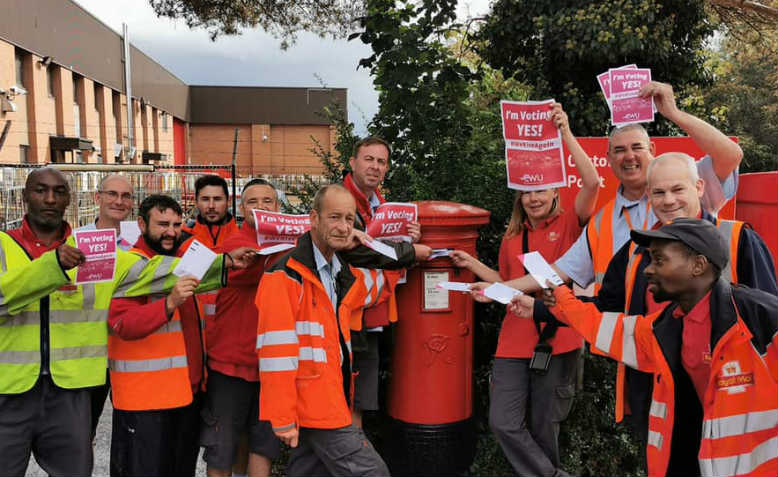 Postal workers voting to take strike action. Photo: Facebook/The Communications Union
Postal workers voting to take strike action. Photo: Facebook/The Communications Union
Andy Hopping from the Postal Executive Council of the CWU spoke to Counterfire’s commissioning editor Katherine Connelly, about what’s at stake in the dispute at Royal Mail
Please could you tell us why the Communication Workers Union (CWU) is balloting at the moment?
The CWU is balloting at the moment due to a new Royal Mail board that has decided to walk away from our Four Pillars agreement that is only 15 months old. The new board is headed up with a new CEO (Rico Back) who came from GLS, a parcel company that has a history of non-unionised workers and low pay.
What kind of changes is Rico Back proposing for Royal Mail?
Rico Back has air brushed all previous managers that were part of our Four Pillars agreement. Negotiations were concluded and a balloted agreement was reached on pay, pensions, shorter working week and a legal binding agreement. The proposal to set Parcelforce into a separate business and transfer TUPE members across is in our opinion against our legally binding agreement.
The union has produced some great videos of postal workers queuing up to vote yes in the ballot. It seems like there’s going to be a big turnout and a big vote for strike action. Why do you think this is the case?
The union has produced a great campaign using social media and a professional comms team to engage our Reps and members. Our members believe that this is the thin edge of a wedge leading towards removing other business units and potentially breaking up the whole postal group. The reason behind breaking up these business units can only be for the desire to drive costs down by cutting jobs and service.
What do you think the response is going to be from the general public? It strikes me that lots of people experience detrimental changes to their working conditions as well as bullying at work – and just last week postal workers in Liverpool walked out against racism towards a Muslim colleague. Do you think that seeing a group workers standing up to some of the day-to-day bullying is going to have an effect on other workers?
Our members are fiercely loyal to the union as we have long-serving members that have seen attempts of this sort in previous attacks on our terms and conditions by different regimes. The response from the public would be that they would support their postal workers as they see the service we offer is more than a job. Many members of the public have seen the damage done with the selling of utilities like gas and electricity. The public does not want to have numerous different companies coming up their paths daily and delivering their mail.
Royal Mail is not like Thomas Cook. It is an extremely successful and well-respected company. We shouldn’t make a change just to make a bigger return in dividends for the major shareholders.
Parcelforce has 52% of the parcel market, so why risk the loss of this through industrial action? As part of our agreement we do have an external mediation process to exhaust before any industrial action is allowed to take place. The industrial action ballot will be in place so that this doesn’t drag on into the new year.
Part of our Four Pillars agreement that is being reneged on was about changing the culture in the workplace. Since Rico’s tenure, this has taken a drastic turn for the worse. The spontaneous walkouts by members over managerial behaviour is commonplace at present. The culture needs to change. Working together with the unions has taken a backwards step and is affecting progression of many major technological improvements.
I’m sure when our ballot result is announced on 15th October, this will give many workers and unions around the country the encouragement and strength to rise up and protect their individual livelihoods.

